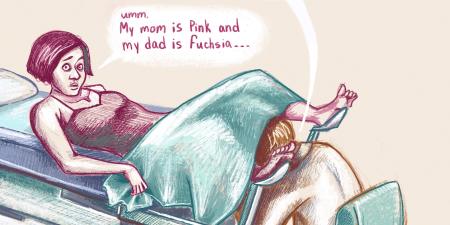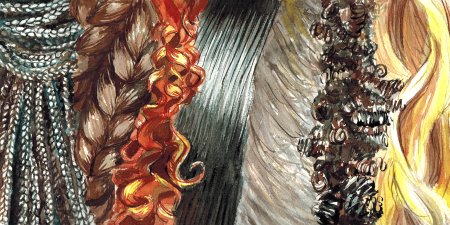Abstract
This drawing considers the importance of understanding history’s role in contextualizing many patients’ present-day health care experiences.
Figure. Bandage and Bondage

Media
Procreate®.
Perhaps the patient in this drawing recognizes her own place in a historical narrative. A well-intentioned nurse might have no idea about how constriction for blood pressure measurement could trigger transgenerational fear in an African American patient whose pulse beats in her arm like a drum, taking her back 200 years when Africans in bondage were medically abused.
James Marion Sims (1813-1833) is credited with being the “Father of American Gynecology,”1 although his victims—Anarcha, Betsey, Lucy, and more—have been largely unacknowledged.2 At right, this drawing echoes J. Marion Sims: Gynecologic Surgeon, a 1952 painting by Robert Thom,3 reminding viewers about forgotten “Mothers of Gynecology.”4 Sims is also credited with inventing the modern-day speculum,1 which has not been significantly improved since the 1840s,5 as many women today can attest. Although racially diversifying practitioners won’t solve structural inequity alone,6 a historically conscious clinician might empathize with patients of color.
References
-
Reverby SM. Memory and medicine: a historian’s perspective on commemorating J. Marion Sims. Perspectives on History. September 17, 2017. Accessed September 30, 2022. https://www.historians.org/publications-and-directories/perspectives-on-history/september-2017/memory-and-medicine-a-historians-perspective-on-commemorating-j-marion-sims
-
Vedantam S, Penman M, Schmidt J, Boyle T, Cohen R, Connelly C. Remembering Anarcha, Lucy, and Betsey: the mothers of modern gynecology. NPR. February 7, 2017. Accessed September 30, 2022. https://www.npr.org/2017/02/07/513764158/remembering-anarcha-lucy-and-betsey-the-mothers-of-modern-gynecology
-
J. Marion Sims: Gynecologic Surgeon, from “The History of Medicine.” University of Michigan Museum of Art. Accessed October 6, 2022. https://exchange.umma.umich.edu/resources/41241/view
-
Kuta S. Subjected to painful experiments and forgotten, enslaved “mothers of gynecology” are honored with new monument. Smithsonian Magazine. May 11, 2022. Accessed September 30, 2022. https://www.smithsonianmag.com/smart-news/mothers-of-gynecology-monument-honors-enslaved-women-180980064/
-
Eveleth R. Why no one can design a better speculum. Atlantic. November 17, 2014. Accessed October 6, 2022. https://www.theatlantic.com/health/archive/2014/11/why-no-one-can-design-a-better-speculum/382534/
-
Zaragovia V. Trying to avoid racist health care, Black women seek out Black Obstetricians. NPR. May 28, 2021. Accessed September 30, 2022. https://www.npr.org/sections/health-shots/2021/05/28/996603360/trying-to-avoid-racist-health-care-black-women-seek-out-black-obstetricians



